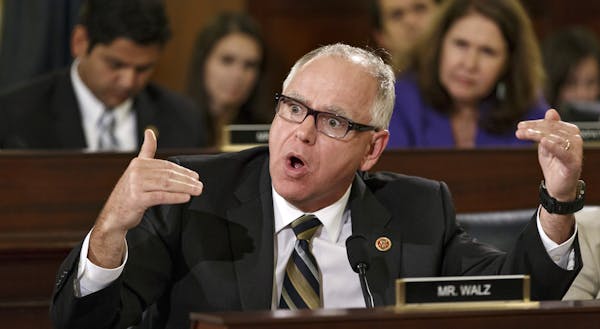Veterans went to the microphone Friday to call for change in culture of the massive Veterans Affairs bureaucracy and to demand accountability from top local leaders who recently were accused of seeking retribution against employees who complained of secret scheduling lists and canceled appointments.
Close to 100 vets attended the town hall meeting in Minneapolis, part of a nationwide effort by the VA to repair an image tarnished by revelations that vets were forced to wait long periods for appointments and that some workers were asked to keep separate books on how long it was taking for patients to be seen.
Local VA officials extolled the accomplishments of the Minneapolis VA, which had enjoyed a stellar reputation among the nation's VA hospitals. The local VA has made more than 600 specialty care appointments since April, addressing a concern about a backlog. It will spend $100 million this year on non-VA care for vets who need it.
But they also acknowledged that mistakes could have been made and have to be addressed.
This week, the VA's inspector general was in town to investigate claims by two former workers that the Minneapolis VA ordered them to falsify records in the hospital's gastroenterology department. The former workers also claim they were fired in retribution.
The Minneapolis VA system also has been flagged in a national audit for potential problems with how wait times were calculated, both at the Minneapolis hospital and at an outpatient clinic in Rochester.
"I fully commit for us to investigate those allegations, to call on the appropriate oversight bodies to help us understand where we may have made mistakes if that's the case, and to correct those mistakes," said Janet Murphy, network director for the VA's Midwest Health Care Network, which includes the Minneapolis hospital. "We probably have some work to do to regain the trust and confidence of veterans and our stakeholders."
Several vets focused on the recent allegations. Jason Quick, Minnesota state director for Concerned Veterans for America, asked why the local whistleblowers were fired while higher-level VA officials are permitted to take administrative leave when accused of wrongdoing.
Minneapolis VA Health Care system director Patrick Kelly said a process is in place to determine whether whistleblowers suffered reprisals because of their actions. Both the VA's inspector general and its Office of Special Counsel have been asked to investigate the recent local claims.
"When they do, there will be actions to hold people accountable if they took the wrong actions in those cases," Kelly said.
Air Force veteran Dennis Davis, who deployed to Afghanistan, complained of long waits for mental health care, pointing out that an average 22 vets commit suicide a day across the nation.
"Why is there an average of six months on claims for [post-traumatic stress disorder] and mental health? That's just to get the claim done and then to get in the next line for care," he said. "That's not right."
Navy veteran Brian Lewis said he has been told his "chronic pain is in his head." Lewis, who told the crowd he was the victim of military sexual trauma, also said care for male victims of sexual assault at the Minneapolis VA is nonexistent.
"If you had a five-star facility providing quality and consistent care, you wouldn't have a room full of people here," he said.
Vets had to brave a long wait to even get into the parking lot for the meeting at the Bishop Henry Whipple Federal Building at Fort Snelling. They were then required to go through a security screening to get through the door.
Not all the focus was on long waiting lines and accountability. Several questions focused on the expense of a recent remodeling of the hospital's atrium.
The first question in the meeting was about why the food is so expensive at the hospital cafeteria.
Mark Brunswick • 612-673-4434
In heated western Minn. GOP congressional primary, outsiders challenging incumbent

Minnesota Sports Hall of Fame: A class-by-class list of all members

This retired journalist changed professional wrestling from Mankato

